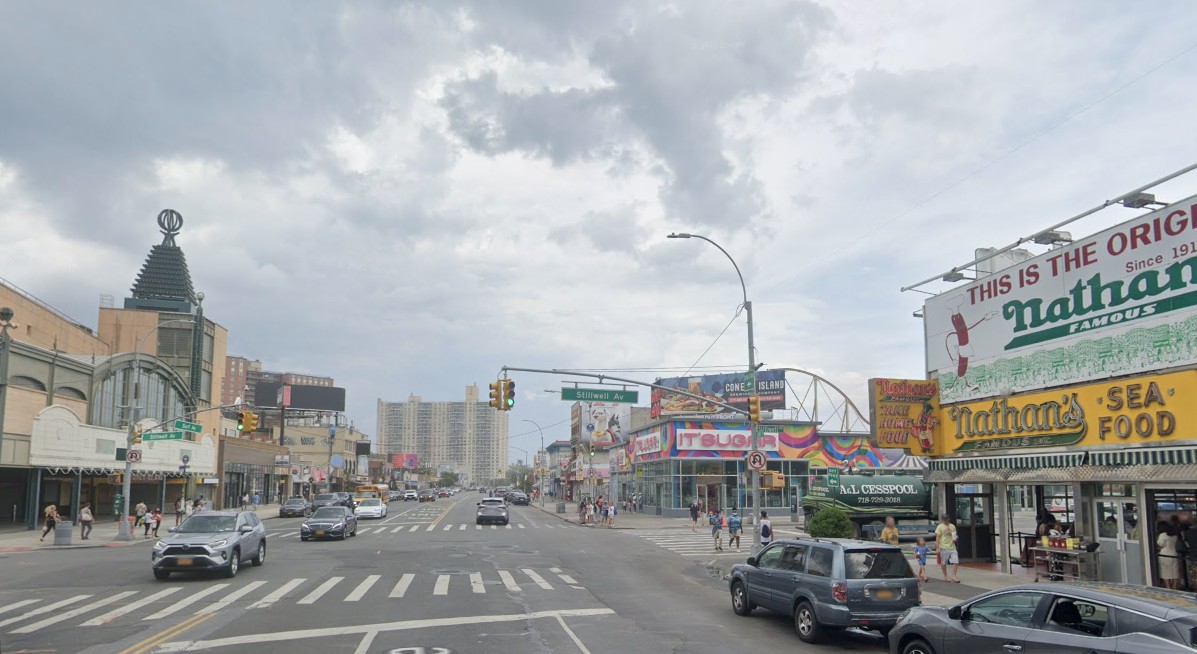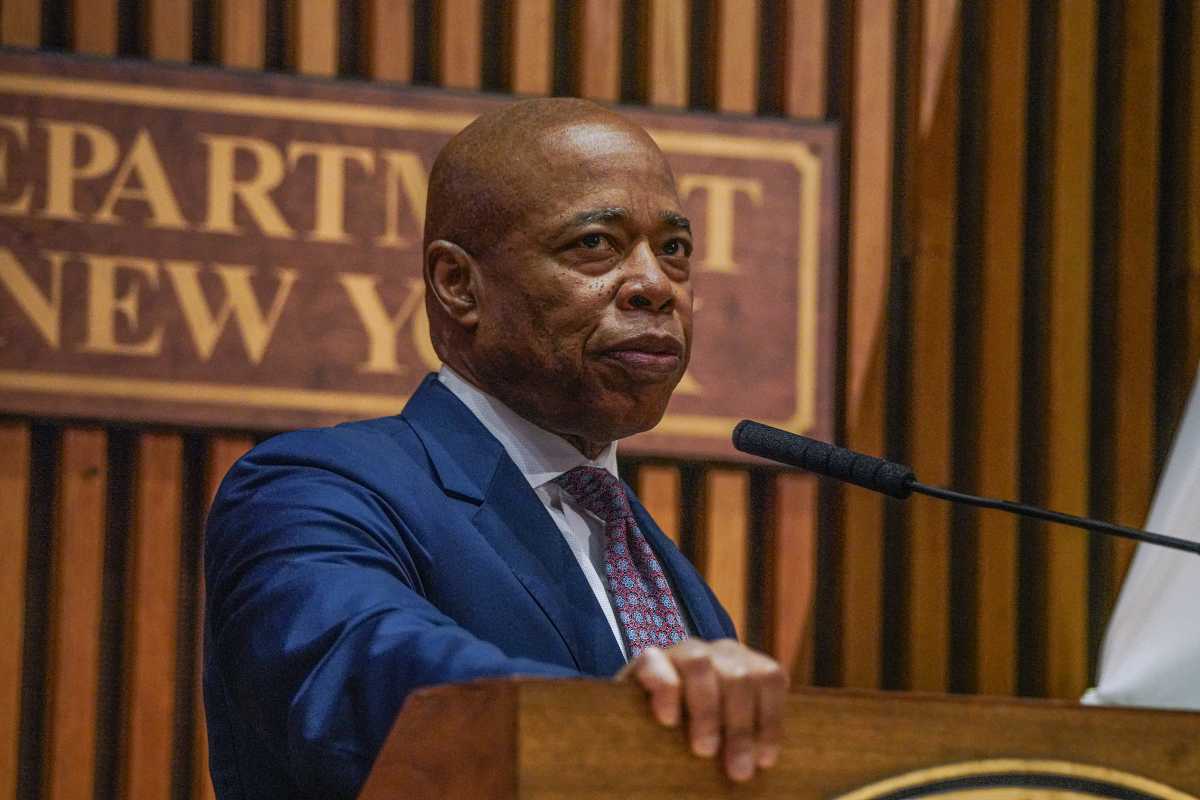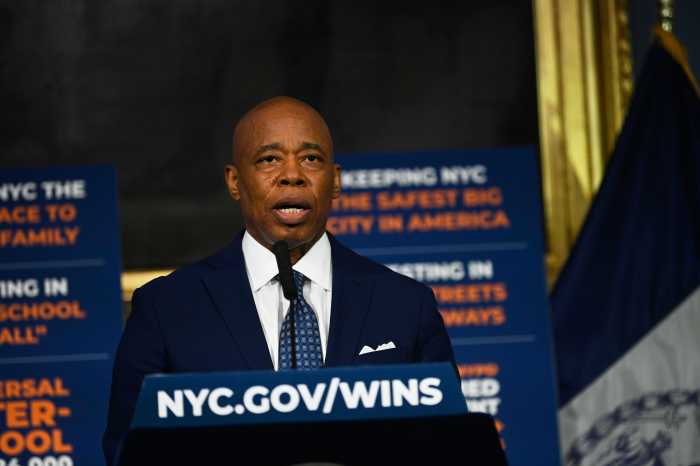Talk about an odd couple.
Supporters of developer Bruce Ratner’s plan to build a 19,000-seat
basketball arena and 17 high-rises in Prospect Heights moved into a vacant
building inside the proposed project’s footprint last week.
Right next door to its loudest opponent.
The building at 640 Pacific St. was acquired by Ratner’s Forest City
Ratner Companies for its Atlantic Yards development, for which the city
and state have agreed to commit $200 million in public funds, as well
as various tax abatements and incentives for building mixed-income housing
and office skyscrapers in the $3.5 billion project.
Hanging over property negotiations in the development site, which is bounded
by Dean Street and Flatbush, Atlantic and Vanderbilt avenues, has been
the threat of eminent domain condemnation of private property should the
project move forward.
Brooklyn United for Innovative Local Development (BUILD), a community-based
group formed specifically to elicit local jobs from Ratner’s project,
has been granted rent-free space right next door to the only property
owner on the block who has refused to sell to Ratner, Daniel Goldstein,
a condo owner whose group Develop-Don’t Destroy Brooklyn has been
the most vocal opponent of the project.
Louis said the free use of the facilities were part of what BUILD had
negotiated in a so-called community benefits agreement (CBA) with the
developer.
Meanwhile, Goldstein said he fears the move is an intimidation tactic
by the developer.
“If Ratner’s trying to do something that he thinks would unify
this neighborhood, and this community, by placing the group that strongly
supports him next to the leaders of the opposition, what exactly is going
on? Is he trying to instigate trouble?” wondered Goldstein.
Louis deflected the suggestion.
“I think it’s great to be directly in the footprint, and directly
across from where the [arena is] going to be built,” she said, noting
that the home court for Ratner’s New Jersey Nets would be the first
phase of construction and jobs.
Goldstein has continued to live in his Pacific Street condominium despite
offers from Ratner to buy it.
The building that now houses BUILD, which formerly housed an importing
business, was sold just over a year ago to Forest City Ratner in the face
of threats of eminent domain condemnation. The block was once home to
100 condo and co-op apartment owners, who have since sold to Ratner.
Now the street is all but desolate.
“I’m not trying to look for any trouble, but it’s very
provocative,” said Goldstein of BUILD moving in.
“Look, this is part of what we negotiated; we negotiated space,”
said Louis. “As far as we’re concerned, it just shows that the
developer is following through on their commitment to give us space.”
The CBA states that Forest City Ratner “shall assist BUILD in finding
suitable space within the community,” but does not say the company
will pay the rent. Louis shrugged off the suggestion of a quid pro quo
arrangement for BUILD’s support.
“It would be one thing if this is something that had happened even
prior to when the [CBA] document was signed, but this is part of what
we discussed, and if we’re going to get these initiatives launched
in a timely manner, it is critical that we get moving now,” she said,
referring to the job-training and job placement the organization has committed
to implementing.
Greg LeRoy is executive director of Good Jobs First, a non-profit policy
group in Washington, D.C. that has advocated for community benefits agreements
and supported the development of CBAs in Los Angeles development projects.
He said negotiations for CBAs tend to be conducted with the agreement
that no party involved will receive favors from another negotiating party.
“As a general statement of principals, anytime you have negotiations
in which there are competing self-interests, and one side grants a favor
to the other, or grants a favor to the member of another set of parties,
that’s a red flag,” said LeRoy. “This is because the question
of, ‘Is there a quid pro quo?’ inevitably arises. “Obviously,
being as impartial and objective in the negotiations is something people
strive for,” he said and wondered if the other individuals and organizations
involved in the CBA negotiations were notified of BUILD’s reward.
Neither Forest City Ratner nor Cheryl Duncan Public Relations, the firm
hired by Ratner to represent the CBA, would release contact or background
information about the organizations that comprise the signatories to the
document.
LeRoy said he understood that while many community groups are “woefully
under-funded,” the trick in creating a strong CBA was to “maintain
the position of an advocate for those [neighborhood] constituencies, and
a full coalition partner.”
“There’s all these gnarly tradeoffs that you get into while
you’re negotiating, without even knowing it,” he said.
Louis said she thought most critics were trying to discredit BUILD’s
achievements.
Said Louis, “I think when people raise all these arguments it’s
because they’re bitter that they didn’t think of taking advantage
of the opportunities.”
























